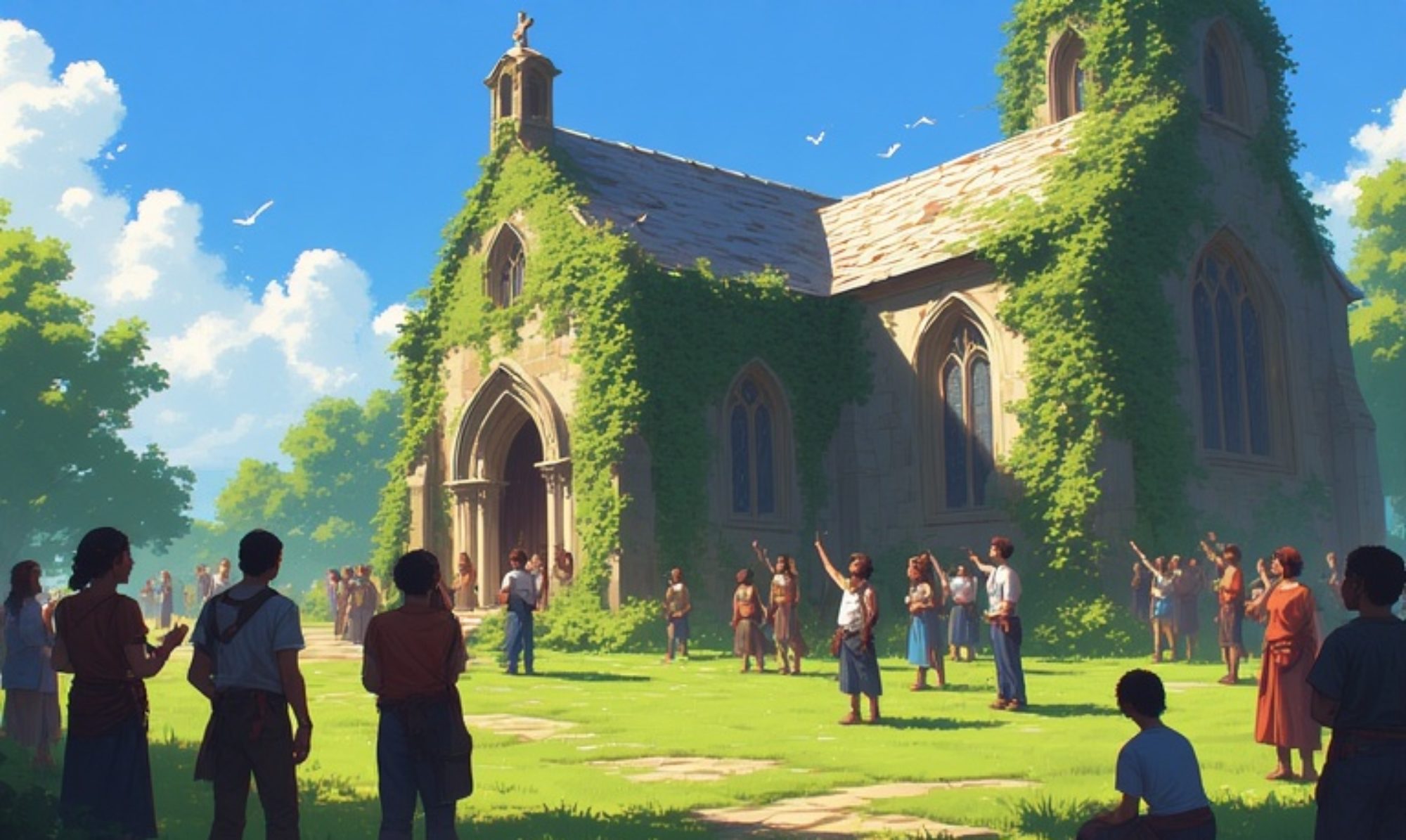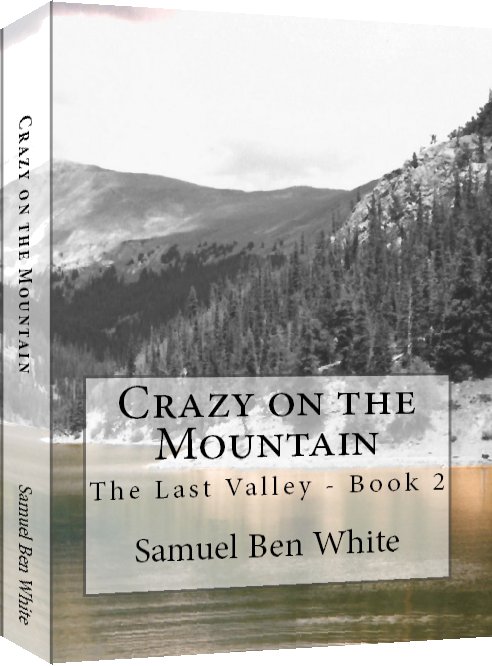Josh Overstreet and his sister Claire have been carving a life out of the ash for more than half a decade, unsure whether anyone yet lives outside the small valley where they have established their town of Overstreet with two dozen others.
Then Deanna Pembleton stumbles into the valley, asking for help for herself and her friends. Claiming they have eked out a life much like that of the people of Overstreet, she begs assistance, which Josh is willing to give. She is, however, clearly unhinged on some level. Could the people she is claiming to want to help just be figments of her imagination?
Against the advice of almost everyone in Overstreet, Josh and Adaline set out to try and take food to Deanna’s people, hoping that people still exist outside “the last valley”.
They never dreamed their valley might not be there for them when they get back.
Be sure and read how this story started in “Ashes to Ashes” and concludes in “Book of Tales“!
Available now on Kindle and paperback.
…
Sample passage
I happened to ask, “Deanna, how long have you lived in Vail?”
“What? Oh, you might say I’ve lived there all my life.” Adaline and I looked at each other in surprise, for this was not said with the hick voice Deanna had mostly been using of late. It also made us wonder about our earlier thought that she was from Denver. She continued, in a somewhat conspiratorial tone, “My great-grandfather was the first of the family to come to Vail. The story that he told his family was that he had been a banker in Birmingham, Alabama,” the names of the city and state were said with a deep, southern accent. “But the bank had gone bust—through no fault of his own, of course, so he had headed west to seek his fortune. He said he worked several jobs in towns both big and small before landing in Vail, broke and starving, worried about his wife and kids back home for it had been some time since he had been able to send them money.
“But it was ski season and he took a job in a kitchen at one of the hotels. He worked hard and sent money back to his family and, by the end of the ski season, had worked his way up to waiter. Over the summer months, he proved himself invaluable and was made assistant manager of the restaurant, and then manager. At that point, he sent for his wife and kids and was ever so happy to see them. He got his kids—who were teenagers by then—jobs in Vail and they saved their money and, would you believe it, one day they bought the restaurant! Using all of his banking and monetary skills, he was eventually able to buy the building the restaurant was in, and his ‘empire’ was begun!”
Deanna chuckled, then said, still in the refined voice of someone who had grown up on the tonier side of life, “And thus began the Coventry empire of Vail. Pembleton is my married name, of course. I grew up attending the best schools, a member of all Vail’s best clubs, and groomed for a career in hoteliery. Yes, I know that’s not really a word, but my father always said it should be. But, I went off to college and fell in love and got married and, well, the last thing I wanted to do was to come back to Vail for anything other than a visit. Best laid plans of mice and men, right? My father had a stroke when I was just about to turn thirty, so my husband and I came back to watch over the business while he recovered. What was supposed to just be a few weeks in Vail became years, with my own children going to those same schools I did, joining the same clubs, being the same spoiled, rich brat I was. Oh how I wish we had never left Denver. My husband, Paul Pembleton, he rose to great heights in Vail, sat on all the important boards and had chairmanships in all the clubs, but I think he always resented the thought that he had only gotten there because of my family connections. It wasn’t true, of course, but it’s how men think sometimes. You know, I think he actually appreciated the ash cloud, for it allowed us all to go back to square one, with no one being anything more or less than what they could contribute.”
In a sly voice, she continued, “But speaking of square one. When my own grandmother was nearing the end of her life, I went and sat with her for many an hour, listening to her stories of growing up in Alabama, of earlier days in Vail than I had ever known. And one night, when she was strangely lucid,” a phrase that got both mine and Adaline’s attention, for we had both been thinking it in relation to Deanna, “She told me a story. According to her, my great-grandfather hadn’t been an innocent bystander in the failure of that bank, but the main instigator. His father was the actual president of the bank, you see, and my great-grandfather had been manipulating loans in some way that allowed him to pocket a sizable sum on the side. Undeclared, you might say.
“Then, one day, maybe he thought his father was about to get on to him, he withdrew an enormous sum of cash from his personal account, walked out of the bank, and no one knew where he went. Didn’t go home or anything. When my great-grandmother called her father-in-law that evening, he said they should call the police, thinking something nefarious had happened to the up-and-coming young banker. Perhaps a ransom call would come in any moment. It was then, so the story goes, that the bank president first realized what his son had been doing. He called his daughter-in-law and convinced her not to file a missing person’s report, for fear of what the publicity would do to the bank. He did agree, however, to engage the services of a private detective.”
Deanna was still speaking in a normal voice, though it became a little dreamy as she said, “I wondered if it were a private eye like in the movies: snap-brim hat, long trench coat, steel-jawed chin. Anyway, the private eye had little trouble following my great-grandfather—though ‘great’ is probably the wrong word for him,” she said with an ironic chortle. “It seems my progenitor had left a bread-crumb trail of prostitutes visited and affairs started that led all the way to Vail, where he was working as a lift attendant at the ski area while, um, serving a rich lady at night while her husband attended to his … let’s say: board functions.
“When the bank president learned of this, he brought his daughter-in-law and the kids out to Vail for a ski trip, hoping to engender one of those movie moments where the miscreant is surprised by his one true love and repents of his wicked ways. According to my grandmother, it was almost like that. Her father was happy to see his children, but not so happy to see his wife. Still, he stopped the fooling around, for a while, and took his family in. His father got him a respectable job as the manager of one of the local restaurants and my great-grandfather gave all appearances of becoming a respectable citizen again. What he was actually doing, though, was continuing his association with the rich lady. He got money out of her somehow and bought the restaurant. Set his wife up as the general manager, dumped the rich lady for a younger mistress, and made his children managers of other properties he had acquired. By the time I came along, great-grandfather was dead and his true story had been buried longer than he had.” She laughed heartily before adding, “There’s even a picture of him in the museum, all dressed up and looking distinguished, with a little plaque about how he was one of Vail’s leading citizens and top philanthropists. He even gave enough money to one of the local churches that they named the recreation building after him. Can’t you just see some youth minister telling the kids who came out to play volleyball, ‘And this building was named after a notorious sinner, who would have slept with any of your mothers who let him, in Jesus’ name, Amen!’” She cackled with laughter and then slipped back into one of her songs. Adaline and I looked at each other strangely, but continued on without a word. We did discuss later how much of the story we thought was true, but had no way to come to a conclusion. And we still thought Deanna was unhinged at best.
We made it to Vail in less than a week, which really encouraged me—and made Adaline wonder why I had thought it would take three weeks. The thing was, I hadn’t been counting on the Interstate being in such good shape, which it was. There were only a couple places where the ash had slid across it, and neither of them deep. And while Black Gore Creek ran strong in some places, it didn’t cross the highway at any point. As we pulled up in sight of Vail, I was smiling and telling Adaline how surprised everyone would be if we pulled back into town before they even came to look for our signal.
“Where are your people?” I asked Deanna, once we had her attention for she had been in the middle of a rousing rendition of either “Amazing Grace” or “I Fought the Law” (it was hard to tell).
She crawled up to crouch behind the front seat and, pointing, said, “Up yonder. You cain’t see it from here, but it’s the other side of that big white building by the ski slopes. I heared you talking about how the wind blew that gash in the ash—gash in the ash,” she repeated with a laugh, “And we had something just like that. People to the left and right was all dead, but our little gash was just fine. All things considered, I mean.”
“Think we can make it before nightfall,” I asked, for we were still a good five miles out, “Or should we make camp and get there in the morning?”
She looked up at the bright spot of the sun that almost shown through the ash and said, “Let’s see if we can push through. If we can’t, at least we can stay in one of the buildings on the edge of town. We might make’er this evenin’, though. Them’s good horses you got there.” This was a surprising statement, for she had frequently complained when we stopped to water the horses or, worse, gave them a lengthy breather and roll when we came upon that rare meadow of thick grass—or any grass. I couldn’t blame her for being anxious to get to her people, but I did get tired of her complaining—especially as we had been making such good time.
As we pulled closer to the town of Vail, some thunderheads started building to the west. “I hate to say it, Deanna, but we may need to pull up and find shelter.”
I had expected an objection, but she looked at the sky and said, “Them’s buildin’ up to be gully-washers, all right.” She pointed off to the right and said, “They’s an old mechanic’s shop up yonder. You’d be able to pull the horses into the dry.”
With impeccable timing we got the old garage doors open and the horses inside the bay just before a wall of summer rain came through. I enjoyed seeing it, though, for it made me think of the rains we used to have when I was growing up. They would come up on us all of a sudden, pelt you with raindrops the size of golf balls, then pass through as quickly as they had arrived. I could see some sunlight to the west, creating a golden line on the mountains in that direction, which made me think this would be one of those storms. It was, but by the time it had passed through it was too late to go anywhere so we set up camp in the old automotive shop. I was afraid Deanna would be upset by us stopping that close to her goal, but she just curled up on a couch in the manager’s office and went to sleep.


